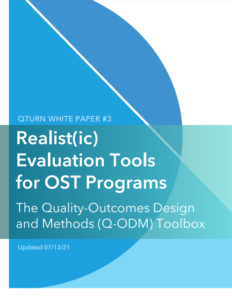Socio-emotional learning (SEL) skills are a partial but necessary cause of children’s developmental outcomes, and SEL skill growth is a key objective for nearly all out-of-school time (OST) programs. The Quality-Outcomes Design and Methods (Q-ODM) toolbox holds an integrated set of tools to measure and model children’s SEL skills, including how they change during, and in response to, OST programs (e.g., afterschool, school-age child care, workforce and career preparation, arts, sports). The Q-ODM toolbox helps organizational managers and evaluators to feasibly and cost-effectively adopt pattern-centered measures and models that produce actionable information for both continuous quality improvement (CQI) and impact evaluation.
The Q-ODM toolbox addresses practical questions about SEL skills and skill growth, such as: What is high-quality SEL support? How much SEL skill change does our program cause in each cycle? How much program quality does it take for stressed children to fully engage? Does our work create equity effects? The tools are divided into three groups: Design Tools, Analytic Tools, and Feedback Tools. These tools increase dramatically the value of CQI feedback for staff and the power of the analytic models used to evaluate program impact and equity effects for participating children. The Q-ODM toolbox was designed to empower internal and local evaluators to conduct rigorous and meaningful impact evaluations using existing resources (e.g., while they are implementing their current CQI systems). These tools will be particularly welcomed by evaluators currently struggling with positivist thinking and methods.
Peck, S. C., & Smith, C., (2020). Realist(ic) Evaluation Tools for OST Programs: The Quality-Outcomes Design and Methods (Q-ODM) Toolbox. [White Paper #3].
